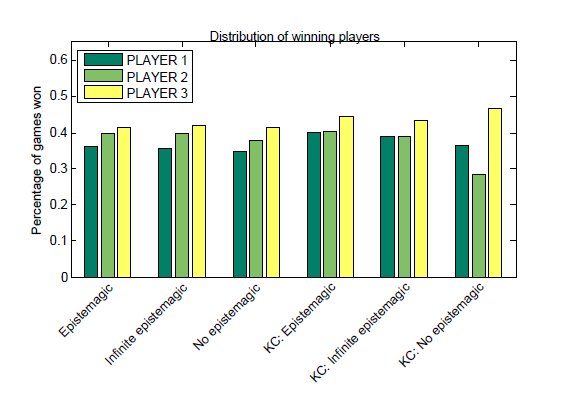| No epistemagic | Epistemagic once | Epistemagic infinite | |
|---|---|---|---|
| Average number of turns | 8.29 ± 4.74 | 6.98 ± 3.53 | 6.82 ± 3.46 |
| Games finished (%) | 100.00 | 100.00 | 100.00 |
| No magic, possible | No magic, full | |
|---|---|---|
| Average number of turns | 22.83 ± 10.64 | 16.55 ± 5.43 |
| Games finished (%) | 79.39 | 99.39 |
| Epistemagic once, possible | Epistemagic once, full | Epistemagic infinite, possible | Epistemagic infinite, full | |
|---|---|---|---|---|
| Average number of turns | 17.67 ± 3.58 | 15.39 ± 3.82 | 17.40 ± 3.98 | 15.06 ± 3.81 |
| Games Finished (%) | 99.07 | 98.97 | 99.02 | 98.85 |
In addition to the number of turns games last on average, we also kept track of the number of times each player wins. The following plot shows the distribution of winners in 6 of the 9 conditions (recall that a game can have multiple winners):

Note that in the plot only Kooi's choice games in which player's choices are based on the information gain in states considered true are shown, because we know that is the most effective way to stall the game. From the plot it is clear that the third player is most likely to be a winner. This should not come as a surprise: She will always hear information from the other two players before having to give information herself. For the Kooi's choice condition, using epistemagic has a dramatic effect on the shape of the distribution. We believe we can explain this in the following way: When players can choose their own questions and a game takes at least twenty turns, the second player is forced to answer the twentieth question. This question was not chosen before because it has a very large information gain. That is why the second player has a disadvantage when players choose their own questions. Using epistemic reasoning shortens the length of the game, making it less likely that the twentieth turn is reached and thereby removing the second player's disadvantage to a certain extent.
These results are analyzed thoroughly in our conclusion.